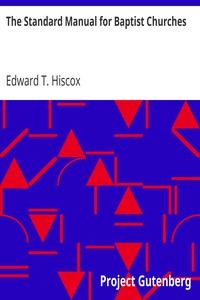Read this ebook for free! No credit card needed, absolutely nothing to pay.
Words: 35695 in 16 pages
This is an ebook sharing website. You can read the uploaded ebooks for free here. No credit cards needed, nothing to pay. If you want to own a digital copy of the ebook, or want to read offline with your favorite ebook-reader, then you can choose to buy and download the ebook.


: The Standard Manual for Baptist Churches by Hiscox Edward T Edward Thurston - Baptists Doctrines; Baptists Government
+STANDARD MANUAL FOR BAPTIST CHURCHES+
A CHRISTIAN CHURCH
The word "church" is, in common language, used with large latitude of meaning. It is applied to a building used for Christian worship, to a congregation of Christian worshipers, to a religious establishment, to a given form of ecclesiastical order, to the aggregate of all Christian believers, and to a local company of Christian disciples associated in covenant for religious purposes. The latter is its common use in the New Testament.
A Christian Church, therefore, according to the New Testament idea, is a company of persons Divinely called and separated from the world, baptized on a profession of their faith in Christ, united in covenant for worship and Christian service, under the supreme authority of Christ, whose Word is their only law and rule of life in all matters of religious faith and practice.
Some Christian denominations include all their congregations in one comprehensive society, or ecclesiastical system, under some central authority, which legislates for and controls the whole. This comprehensive society they call the church. Thus we speak of the Roman Catholic Church, the Episcopal Church, the Presbyterian Church--where the word "church" stands for the aggregate of all their local societies. With Baptists it is different. They speak of Baptist churches, but not of the Baptist Church, when the entire denomination is meant. The Baptist Church would mean some one local congregation of baptized believers.
Thus was it in Apostolic times. There was "the church in Jerusalem," "the church of the Thessalonians," "the church of Babylon," "the church of the Laodiceans"; but "the churches of Macedonia," "the churches of Asia," "the churches of Judea." A church, therefore, is not a system of congregations confederated under a general government, but a single local congregation of Christian disciples associated in covenant and meeting together for worship. In this sense the word is commonly, almost uniformly, used in the New Testament.
Churches are Divinely instituted to be "the light of the world" and "the salt of the earth." They are ordained for the glory of God, as "the ground and pillar of the truth," in the proclamation of His Gospel and the establishment of His kingdom in the world. They are commissioned to preach the Gospel to men, and to live the Gospel before men, that Christ may be honored and sinners saved. They should, therefore, be constantly striving to realize the grand purpose of their existence and fulfill the mission of their high calling. That church which does the most to honor Christ and save man will be the most honored by Him, and the most influential and prosperous in all that pertains to the true functions of a church. And since a church, as a body, is what its individual members are in their religious life and influence, therefore each member should strive to become in holy living what He desires the church to be.
NOTE 1.--A body of Christian disciples may fail to meet some of the requirements of the Gospel, and still be a true church of Christ, providing it fulfills the fundamental conditions of a Scriptural faith and practice.
NOTE 2.--But when a body ceases to acknowledge and submit to Christ as its Supreme Ruler, and to receive His Word as its supreme law, then it ceases to be a true church, and is simply a religious society, though it may still accept some of His doctrines and practice some of His precepts.
NOTE 3.--A church is not a legislative, but an executive body. It cannot make laws, but only obey and administer those which Christ has given in the New Testament. He is the only Lawmaker in Zion.
NOTE 4.--But in matters pertaining to order and methods of administration, merely optional and discretionary, not involving fundamental principles, the church is to exercise its liberty, so long as it does not contravene Scriptural teaching or infringe the rights of its members.
NOTE 5.--And still further, while a church cannot become an authoritative expounder of either truth or duty, to bind the consciences even of its members, yet it does possess a judicial function for the interpretation and the enforcement of the laws of Christ for itself as a body, and, therefore, for its members, so far as their relation to the compact is concerned.
Free books android app tbrJar TBR JAR Read Free books online gutenberg
More posts by @FreeBooks

: Neddie and Beckie Stubtail (Two Nice Bears) Bedtime Stories by Garis Howard Roger Wisa Louis Illustrator - Children's stories; Bears Juvenile fiction


: Cinderella Story by Lang Allen Kim Gaughan Jack Illustrator - Science fiction; Human-alien encounters Fiction; Banks and banking Fiction





